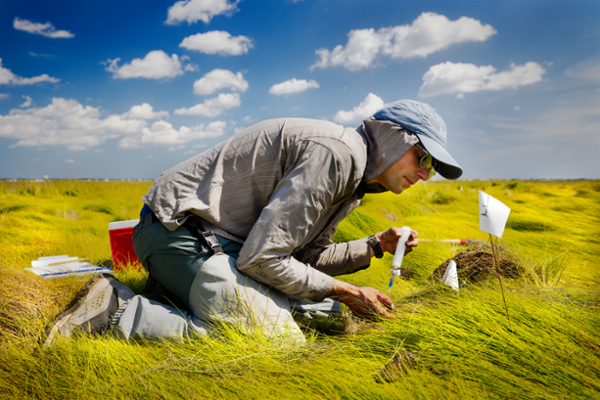Rowan prof joins $2.9 million NSF-funded study into marshlands methane production
Rowan prof joins $2.9 million NSF-funded study into marshlands methane production

Methane, a naturally occurring gas emitted by plants and animals, is also a heat-trapping greenhouse gas that contributes to global warming, and a Rowan University researcher has joined an NSF-funded study into the production of it.
“That there are greenhouse gases from natural systems is normal,” said Dr. Charles Schutte, an assistant professor of Environmental Science in Rowan University’s School of Earth & Environment. “In fact, we’d be way too cold on Earth if it weren’t for greenhouse gases in our atmosphere.”
The problem is that while methane is, in fact, a naturally occurring greenhouse gas, human sources since the Industrial Revolution have increased the amount of it in the planet’s atmosphere, which has contributed to rising temperatures.
Schutte is among a team of researchers in a $2.9 million study funded by the National Science Foundation to determine if methane produced in saltwater marshlands – a key source of the gas – is increasing or decreasing as a result of climate change and rising sea levels.
The research team includes scientists from Louisiana State University, the University of Mississippi, the University of Kentucky and the Louisiana Universities Marine Consortium (LUMCOM) and seeks to determine whether climate change is causing naturally occurring methane from salt marshes to rise or fall.
Schutte conducted research at LUMCON prior to his work at Rowan and is participating in the five-year study centered in the salt marshes of the Louisiana Delta.
One challenge with the study is that natural methane production in salt marshes fluctuates widely, is affected by a variety of factors like rising sea levels and sediment changes, and studying it is complex, he said.
Microbial processes in salt marshes create methane and while plants in marshes absorb carbon dioxide and offset climate change, they also release organic matter into the marshes that feed the methane-producing microbes.
“We’re combining a lot of different tools and techniques to take apart these processes to better understand methane cycling and fluxes,” Schutte said.
In addition to his work on the Louisiana-based study, Schutte secured a $138,650 grant from the New Jersey Sea Grant Consortium in 2022 to better understand what will happen with methane production in Garden State salt marshes as sea level rises.